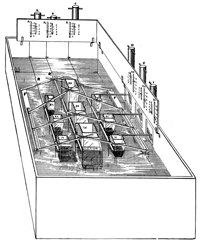| School | Troops | Resources |
The American Marginalists
(Social Value and Psychological Schools)
There was a varied collection of turn-of-the-century American proponents of the Marginalist Revolution.
The arrival of the Marginalist Revolution to the United States was not quick. In the 19th Century, American economists were generally suspicious of British classical economics and the French liberal school, viewing its "free trade" dogmas as conflicting with their preferred protectionist "American System", so it sometimes hard to disentangle American critics of the Ricardian system with converts to marginalism proper.
Among the former we can include Arthur Latham Perry, a proponent of the "catallactic" school, and Francis A. Walker, whose critique of the wages fund doctrine and progenitor of the residual claimant theory of distribution can be seen as clearing the ground for the arrival of marginalism. Among the latter are Simon Newcomb, who followed the English Jevonian literature from the outset. And then there are the homegrown marginalists, like John Bates Clark, who came to the marginalist revolution quite independently: Clark "discovered" the marginal utility theory of value on his own in 1881; he is also credited as the first discoverer of the marginal productivity theory of distribution in 1889 (really, an elaboration of Walker's own).
Clark, like many American academics of his time, was part of the "New Generation" of American economists, who went study abroad to Germany. Most were trained in the German Historicist tradition, and brought that back to the United States in the 1870s and 1880s, which would later evolve into the American Institutionalist School. But some of the new generation economists came across the work of the Austrian School abroad. And it is through Austrian economics, notably the works of B÷hm-Bawerk (who deigned to print in American journals), that the marginalist revolution became familiar in the United States in the 1890s.
For a while, it was possible to distinguish between the homegrown Clarkian marginalism and the imported European variety. Clark did not start off from individual psychology, but rather from a "collective" or rather a "social organism" psychology (echoing his own German training). Clark limited his explanation of value in marginal utility terms in reference to the value of the national product as a whole. Clark's "Social Value" approach was followed, in various degrees, by his Columbia students, like Alvin S. Johnson, Benjamin M. Anderson and Paul H. Douglas.
European marginalism, particular the Austrian School variety, was forwarded in the United States by Irving Fisher, Frank A. Fetter and Herbert J. Davenport. Traditionally, the label, "American Psychological School" was coined by Fetter to apply exclusively to this particular group. However, we should note that all of these American authors were wary of the hedonistic implications of the "utility" concept. They all focused on the "preference" aspect of economic choice in price-formation, eschewing all explanations in terms of the hedonic calculus of pleasure and pain. They argued that economic choice was consistent with all sorts of human psychology.
The relationship between the American "Social Value" and "Psychological" schools was not an intimate one. Both Fetter and Davenport attacked the Social Value school for their "optimistic" -- or rather, "apologist" -- implications. In this assault, they were joined by the Austrian economists, like B÷hm-Bawerk (1896), Schumpeter (1909) and Wieser (1914).
Neither the Social Value nor the Psychological School exhausted the varieties of marginalism that would emerge in the United States in the early 20th C. In Henry L. Moore and his student, Henry Schultz, we have the Lausanne School's ambassadors to the United States. However, they were far less interested in the controversial questions of utility and value and more in the analysis and estimation of mathematical general equilibrium systems. Sidney Sherwood at John Hopkins and Frank W. Taussig of Harvard another set of early converts, instrumental in the "Neoclassicization" of their departments.
|
American Proto-Marginalists
Early Converts to the Marginalist Revolution
The Clarkian "Social Value" School
The American Psychological School
Later American Neoclassicals
|
HET
|
|
Resources on American Psychological School
|
All rights reserved, Gonšalo L. Fonseca

